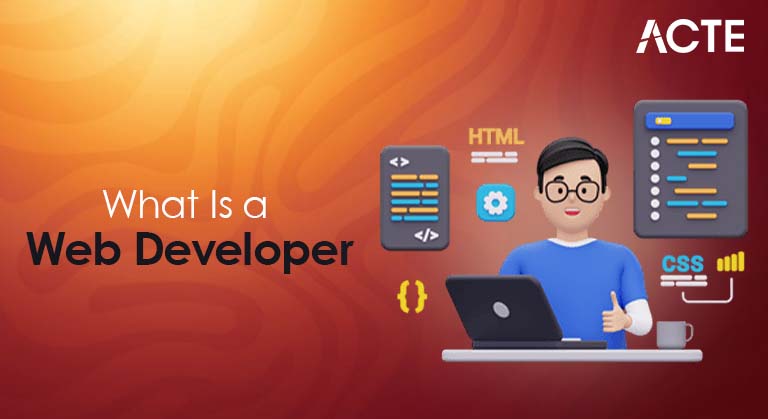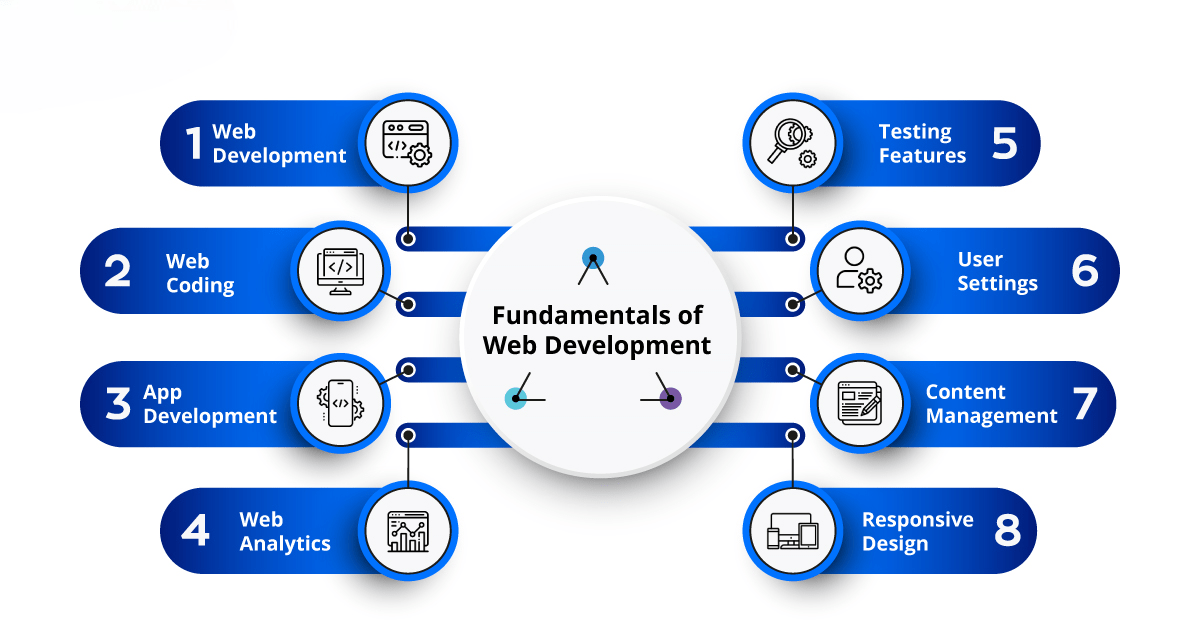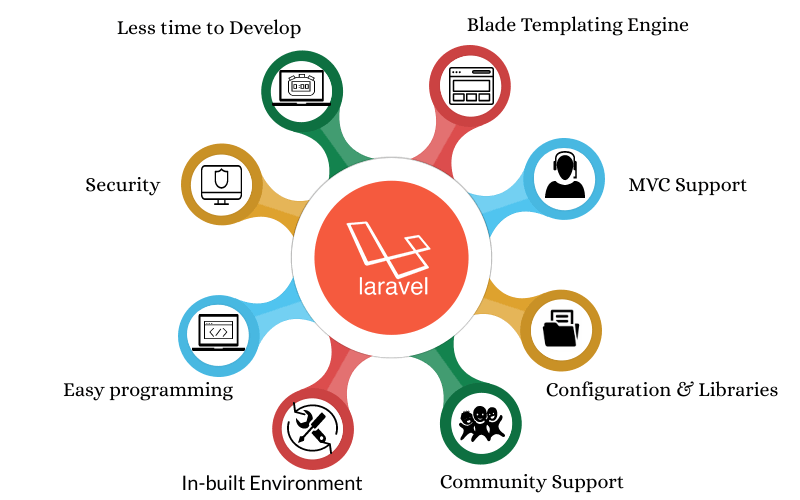
- Introduction to Web Developer Role
- Types: Frontend, Backend, Full Stack
- Key Skills Required
- Common Technologies Used
- Responsibilities of a Web Developer
- Tools and Frameworks Used
- Learning Path for Beginners
- Web Developer vs Software Engineer
- Freelancing vs Full-Time Roles
- Salary Trends and Career Scope
- Certifications and Courses
- How to Become a Web Developer
- Conclusion
Introduction to Web Developer Role
Web development is both an art and a science, focused on building websites and web applications that are not only visually appealing but also functionally sound and user-centric. Professionals in this field play a crucial role in shaping the online experiences we engage with every day. From using programming languages and frameworks to applying design principles, they transform ideas into digital realities. Whether it’s crafting a personal blog, developing a feature-rich e-commerce platform, or architecting a robust enterprise system, web developers are integral to the digital landscape. As the digital transformation accelerates, the scope of a web developer’s role has expanded significantly. They are no longer just coders; they’re also designers, strategic thinkers, and collaborative innovators. By turning business goals into interactive, engaging solutions, they help power the digital economy. For those looking to enter or grow in this dynamic field, exploring Web Designing & Development Courses is a smart step toward mastering the skills needed to thrive in this evolving profession.
Types: Frontend, Backend, Full Stack
Web development is often categorized into three primary roles:
- Frontend Developer: This type of developer focuses on the client side of web development. They design and develop what users see and interact with within their web browsers. Technologies typically include HTML, CSS, JavaScript, and frontend frameworks like React, Angular, or Vue.js. Frontend developers work closely with UX/UI designers to implement visually engaging and user-friendly interfaces. Their work ensures a smooth, intuitive user experience.
- Backend Developer: This type of developer focuses on the server-side of web applications, handling everything from databases and server logic to application integration. Common programming languages in this area include PHP, Python, Ruby, Java, and Node.js. Backend developers play a key role in ensuring data flows smoothly between the user interface and the server, while also managing critical aspects like security, user authentication, and performance optimization. For those interested in entering this field, understanding more about How to Become a Web Developer can provide a clear roadmap to acquiring the necessary skills and knowledge.
- Full Stack Developer: Combines both frontend and backend skills. They handle everything from the user interface to database management, offering a complete package of development expertise. Full-stack developers are in high demand because of their versatility. They can work independently or support smaller teams that require multi-disciplinary skills.
Each role is crucial, and collaboration between frontend and backend developers ensures that applications are functional, scalable, and engaging. Due to their all-in-one capabilities, full-stack developers often lead small projects and startups.

Key Skills Required
To become a successful web developer, a solid mix of technical and soft skills is needed:
- Proficiency in HTML, CSS, and JavaScript: These are the core building blocks of web pages and user interfaces.
- Understanding responsive design and cross-browser compatibility: It is essential to ensure that websites look and function well on different devices and browsers.
- Experience with at least one backend language (e.g., Python, PHP, Node.js): Helps manage server logic and databases.
- Database knowledge (SQL, MongoDB): Data is central to most applications, and managing it efficiently is a key skill.
- Version control (e.g., Git): Essential for collaboration and code management.
- Problem-solving and debugging: Critical for finding and fixing issues during development.
- Communication and collaboration: Working with team members, clients, and stakeholders requires effective interaction.
As web technologies evolve rapidly, a continuous learning mindset is crucial. Developers should regularly explore new trends, attend workshops, and participate in communities to stay ahead.
Common Technologies Used
Web developers work with a wide range of tools and technologies to create modern web applications. One important consideration when choosing a development stack is understanding the differences between key factors to consider when MEAN Stack vs Full Stack On the frontend, essential technologies include HTML5, CSS3, JavaScript, and frameworks like React, Angular, Vue.js, and Tailwind CSS. Backend development often involves tools such as Node.js, Django, Laravel, Ruby on Rails, and Java Spring Boot. Databases like MySQL, PostgreSQL, MongoDB, and Firebase are used to manage and store data efficiently. To manage code and collaboration, developers rely on version control systems like Git, along with platforms such as GitHub, GitLab, and Bitbucket. Deployment is supported by tools like Docker, Kubernetes, Netlify, Vercel, Heroku, and AWS. These tools come together to form the project’s technology stack, chosen based on project needs, team expertise, and scalability goals. A well-known example is the MERN stack (MongoDB, Express.js, React, and Node.js), commonly used in full-stack development.
Excited to Obtaining Your web developer Certificate? View The web developer course Offered By ACTE Right Now!
Responsibilities of a Web Developer
A web developer’s duties vary depending on their role, but generally include:
- Developing and maintaining websites and web applications
- Writing clean, efficient, and scalable code
- Testing and debugging applications
- Collaborating with designers, product managers, and other developers
- Ensuring sites are accessible and optimized for SEO
- Integrating APIs and third-party services
- Updating website content and implementing new features
- Optimizing sites for performance and speed
- Basic Web Technologies: Learn HTML, CSS, and JavaScript. Practice creating static pages and layouts.
- Build Projects: Start with simple websites like portfolios, blogs, or landing pages. Practice is key.
- Version Control: Learn Git and GitHub. Understand how to commit, push, pull, and resolve conflicts.
- Frontend Frameworks: Pick one (React, Vue, or Angular) and build dynamic interfaces.
- Backend Development: Learn Node.js or Python with a framework like Express or Django.
- Databases: Understand relational (MySQL) and non-relational (MongoDB) databases.
- API Integration: Learn to consume REST APIs and understand HTTP methods and JSON.
- Deployment: Deploy projects using Netlify, Heroku, or Vercel. Understand DNS, SSL, and hosting.
- Advanced Topics: Explore authentication, testing, performance optimization, and security.
- Freelancing: Offers flexibility, independence, and varied projects. However, it requires self-discipline, client management, and handling taxes and marketing. Freelancers must build a strong portfolio, maintain client relationships, and constantly seek new opportunities. Platforms like Upwork, Fiverr, and Toptal provide access to freelance gigs.
- Full-time employment provides job stability, regular income, team collaboration, and benefits. It may offer less flexibility but more structured growth and mentorship opportunities. Developers in full-time roles often receive health insurance, paid leave, and opportunities for promotions and skill development.
- Frontend Developer: $60,000 – $110,000 annually in the US
- Backend Developer: $70,000 – $120,000 annually in the US
- Full Stack Developer: $75,000 – $130,000 annually in the US In India:
- Entry-Level: INR 3 LPA to INR 6 LPA
- Mid-Level: INR 6 LPA to INR 12 LPA
- Senior-Level: INR 12 LPA to INR 25+ LPA
- Set Your Goal: Choose between frontend, backend, or full-stack based on your interests.
- Start Learning: Use free resources like W3Schools, MDN Web Docs, FreeCodeCamp, and YouTube tutorials.
- Take Courses: Enroll in online boot camps or certification programs for guided learning.
- Practice: Build your portfolio with real projects. Include GitHub links, live demos, and descriptions.
- Join Communities: Engage with forums like Stack Overflow, Reddit, Dev, and GitHub.
- Apply for Jobs: To gain experience, start with internships or freelance gigs. Customize your resume and cover letter.
- Keep Learning: Stay updated with new tools, trends, and best practices by following blogs, newsletters, and influencers.
Advanced responsibilities may include mentoring junior developers, conducting code reviews, writing technical documentation, and contributing to open-source projects. In agile environments, developers may also participate in sprint planning, daily stand-ups, and retrospectives.
Interested in Pursuing Web Developer Master’s Program? Enroll For Web developer course Today!
Tools and Frameworks Used
Modern web development relies on a diverse ecosystem of tools and frameworks that enhance productivity and ensure high code quality. On the frontend, developers use technologies like Bootstrap, Tailwind CSS, SASS, Webpack, and Babel to streamline styling and optimize performance. For backend development, frameworks such as Express.js, Flask, ASP.NET, Koa.js, and Spring Boot provide solid foundations for building scalable server-side applications. Integrated development environments (IDEs) and editors like Visual Studio Code, Sublime Text, Atom, and WebStorm offer flexible platforms for efficient coding. Testing tools including Jest, Mocha, Chai, Cypress, and Selenium help maintain the reliability and functionality of applications. In the world of DevOps and continuous integration/continuous deployment (CI/CD), solutions like Jenkins, Travis CI, GitHub Actions, CircleCI, and Docker Compose are essential for automating development workflows and deployment pipelines. Mastering these tools is vital for any modern developer and pursuing a Web Developer Certification can provide the structured learning and validation needed to confidently navigate this complex landscape and advance in the field.

Learning Path for Beginners
Starting a career in web development involves continuous learning and practice. Here is a recommended path:
Practice coding on platforms like CodePen, CodeSandbox, LeetCode, and GitHub. Contribute to open-source projects and build a portfolio to showcase your skills to potential employer.
Web Developer vs Software Engineer
While the roles of web developers and software engineers often overlap, there are clear distinctions between the two. A web developer primarily focuses on building and maintaining websites and web applications, working extensively with web technologies and platforms such as WordPress, Shopify, and Drupal. Choosing the right frontend framework is also a key part of this role understanding the differences between Angular vs React can help developers make informed decisions based on project needs and team preferences. In contrast, a software engineer has a broader scope, developing software systems that may extend beyond the web, including applications for desktops, mobile devices, and embedded systems. Software engineers apply computer science principles to address complex problems across diverse domains. Many web developers transition into software engineering roles by expanding their knowledge in areas such as algorithms, data structures, system design, and programming languages like C++, Java, or Rust.
Freelancing vs Full-Time Roles
Each work style offers different benefits and challenges:
Depending on their goals and lifestyle preferences, many developers explore both paths throughout their careers. Some start as freelancers to build experience and later transition to full-time roles, or vice versa.
Salary Trends and Career Scope
Web development continues to be a lucrative career path. Salaries vary by location, experience, and specialization:
With the growth of tech startups, e-commerce, and SaaS companies, demand for web developers is increasing. Emerging technologies like Progressive Web Apps (PWAs), JAMstack, AI, and Web3 offer exciting new opportunities for innovation and specialization.
Certifications and Courses
Certifications can significantly enhance your credibility and unlock new job opportunities in web development. Some recommended options include the FreeCodeCamp Web Development Certification, which is free and highly practical, and Coursera’s Web Development Specializations, which are backed by reputable universities. To complement formal learning, exploring the Best Web Development Tools can help you stay productive and up to date with industry standards. The Google UX Design Certificate emphasizes user-centered design, while Meta offers professional certifications for both frontend and backend development. For those interested in cloud development, the Microsoft Certified: Azure Developer Associate is a valuable credential. Udemy’s Full-Stack Web Developer Bootcamp provides a comprehensive path from beginner to advanced levels, and the edX Professional Certificate in Web Programming from Harvard offers a more academic and rigorous approach. Many of these platforms provide free trials or financial aid, making certification accessible to a wide range of learners. Earning certifications not only validates your skills but also strengthens your resume and professional profile.
How to Become a Web Developer
Becoming a web developer requires dedication and a strategic approach:
Persistence is key. Becoming a web developer can take months or years, depending on your commitment and learning style. But with consistency and curiosity, you can achieve your goal and enter a fulfilling career.
Conclusion
Web development is a dynamic and rewarding field that continues to evolve alongside advancing technology. It blends creativity, logic, and problem-solving to shape the websites and applications that define our digital world. Whether you’re passionate about visual design, coding, data management, or user experience, there’s a niche in web development that suits your interests and strengths. With opportunities ranging from building simple websites to developing sophisticated web applications, web developers play a key role in how users interact with the online world. It’s a field where innovation meets practicality, and every project brings a new challenge and a chance to grow. If you’re ready to turn curiosity into skill, exploring Web Designing Training can be a great first step toward entering this exciting profession. Now is the perfect time to start your journey and join a global community of developers dedicated to building the Internet of tomorrow—where creativity, technical skill, and lifelong learning are truly valued.

